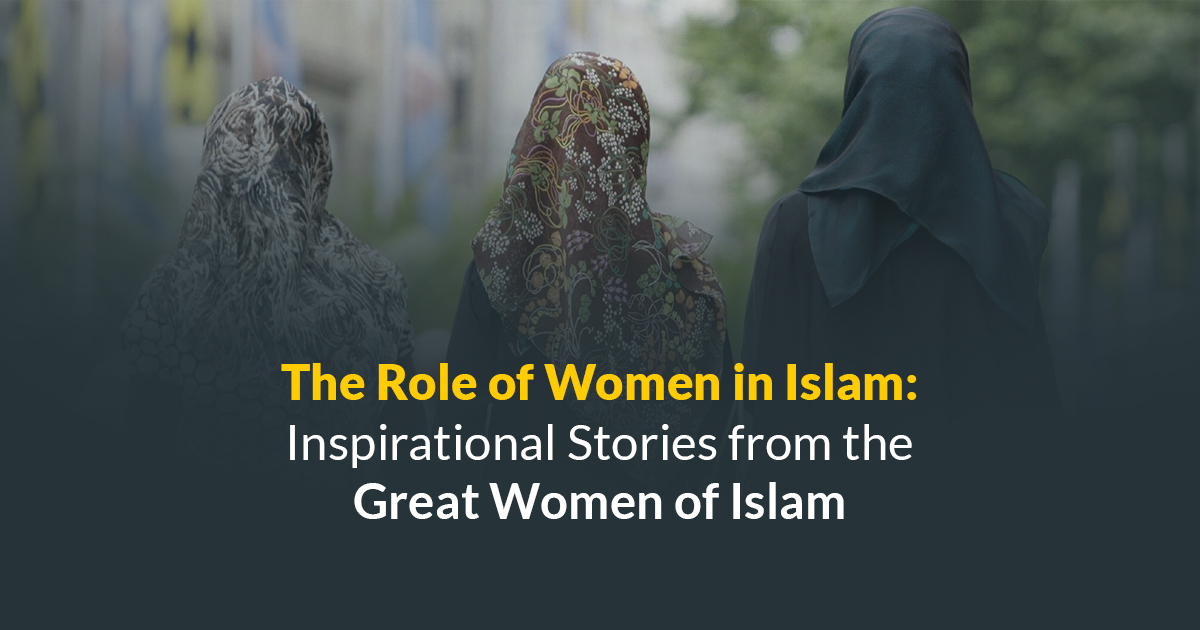Explore the inspiring stories and contributions of great women in Islam. From historical figures in the Quran to modern-day influencers, discover how women have shaped Islamic history, faith, and society.
Islam has always placed great importance on the role of women in society. From the earliest days of the faith, women have played crucial roles as leaders, scholars, and spiritual guides. heir stories inspire millions of Muslims around the world today.
The Quran and the teachings of Prophet Muhammad (peace be upon him) emphasize the importance of women in building strong, just societies. As Allah says in the Quran:
“The believing men and believing women are allies of one another. They enjoin what is right and forbid what is wrong.” (Quran 9:71)
This divine guidance sets the stage for women’s active participation in all aspects of Islamic life. Throughout Islamic history, we find inspiring examples of women who embodied the highest virtues of faith and made lasting contributions to their communities.
In this article, we’ll explore the lives of remarkable Muslim women who have left an indelible mark on Islamic history. Their stories teach us about:
- Unwavering faith in the face of challenges
- Exemplary leadership in various fields
- Ground-breaking scholarship that shaped Islamic thought
- Enduring legacies that continue to inspire Muslims today
By learning about these great women, we gain a deeper understanding of the true role of women in Islam. Their examples challenge stereotypes and offer powerful role models for Muslims of all genders.
Early Women in Islam – Setting the Foundation

The early days of Islam saw extraordinary women who played pivotal roles in establishing and spreading the faith. Their contributions laid the groundwork for the rich tradition of female scholarship and leadership in Islamic history.
Khadija bint Khuwaylid: The First Believer
Khadija, the first wife of Prophet Muhammad (peace be upon him), holds a special place in Islamic history. Her life exemplifies faith, support, and wisdom.
Key aspects of Khadija’s life and legacy:
- First person to accept Islam
- Successful businesswoman who used her wealth to support the early Muslim community
- Provided emotional support to the Prophet during the challenging early years of his mission
- Mother of Fatimah, continuing her legacy through her descendants
The Prophet said about Khadija:
“She believed in me when no one else did; she accepted Islam when people rejected me; and she helped and comforted me when there was no one else to lend me a helping hand.” (Musnad Ahmad)
Khadija’s unwavering faith and support show the crucial role women played in the foundation of Islam.
Aisha bint Abu Bakr: The Scholar of Islam
Aisha, another wife of the Prophet, became one of the most influential scholars in Islamic history. Her intelligence, memory, and curiosity allowed her to preserve and transmit a vast amount of Islamic knowledge.
Aisha’s contributions to Islamic scholarship:
- Narrated over 2,000 hadiths (sayings and actions of the Prophet)
- Provided valuable insights into the Prophet’s private life and character
- Clarified numerous points of Islamic law and practice
- Taught many of the Prophet’s companions and subsequent generations
Her influence on Islamic jurisprudence was profound. Many scholars would seek her opinion on complex legal matters.
Aisha’s life demonstrates that women can be leaders in religious knowledge and education, setting a precedent for female Islamic scholarship that continues to this day.
Fatimah: The Beloved Daughter
Fatimah, the youngest daughter of Prophet Muhammad and Khadija, holds a special place in Islamic history. Known for her piety, generosity, and patience, Fatimah embodies the spiritual and familial values central to Islam.
Key aspects of Fatimah’s life and influence:
- Exemplar of faith and devotion in the face of hardship
- Strong supporter of her father’s mission
- Mother of Hasan and Hussain, continuing the Prophet’s lineage
- Revered by both Sunni and Shia Muslims as a model of virtue
Allah’s Messenger (ﷺ) said, “Fatima is a part of me, and he who makes her angry, makes me angry.”
Fatimah’s life teaches us about the importance of family bonds, patience in adversity, and living a life devoted to faith and service.
These three women – Khadija, Aisha, and Fatimah – set the foundation for the role of women in Islam. Their examples of faith, scholarship, and family leadership continue to inspire Muslims worldwide.
By learning about their lives through books like “Great Women of Islam” available from Darussalam, we gain a deeper appreciation for the central role women have played in shaping Islamic history and society. Their stories challenge us to recognize and support women’s contributions in all areas of Muslim life, following the true teachings of Islam.
Women in the Quran – Lessons of Faith and Strength

The Quran mentions several women as examples of faith, wisdom, and virtue. Their stories offer powerful lessons for all Muslims, regardless of gender.
Maryam (Mary): A Model of Purity and Devotion
Maryam, mother of Prophet Isa (Jesus), holds a special place in Islamic tradition:
- The only woman mentioned by name in the Quran
- An example of complete trust in Allah
- Praised for her chastity and devotion
The Quran says:
“And [mention] when the angels said, ‘O Mary, indeed Allah has chosen you and purified you and chosen you above the women of the worlds.'” (Quran 3:42)
Maryam’s story teaches us about:
- Unwavering faith in the face of societal pressure
- The importance of purity in body and spirit
- Accepting Allah’s will, even when it seems impossible
Asiyah: Strength in Adversity
Asiyah, the wife of Pharaoh, is mentioned in the Quran as an example of faith under extreme oppression:
- Adopted and protected the infant Musa (Moses)
- Maintained her faith despite her husband’s tyranny
- Chose her beliefs over worldly comfort and safety
The Prophet Muhammad said:
“Among men, many have reached perfection, but among women, only Maryam the daughter of Imran and Asiyah the wife of Pharaoh have reached perfection.” (Sahih al-Bukhari)
Asiyah’s story teaches us:
- The power of faith to overcome oppression
- The importance of standing up for what’s right
- That true believers can exist in unlikely places
These Quranic examples show that spiritual excellence is not limited by gender. They offer universal lessons of faith, wisdom, and courage that continue to inspire Muslims today.
Female Scholarship in Islamic History
Throughout Islamic history, women have played crucial roles in preserving and teaching Islamic knowledge. Their contributions have shaped Islamic scholarship and education.
Hafsa bint Umar: Guardian of the Quran
Hafsa, daughter of Umar ibn al-Khattab and wife of Prophet Muhammad, played a vital role in preserving the Quran:
- Entrusted with the first complete written copy of the Quran
- This copy became the basis for the standardized version of the Quran
- Her care and diligence helped ensure the Quran’s preservation
Hafsa’s role shows:
- The trust placed in women with important religious tasks
- Women’s active participation in preserving Islamic scripture
- The importance of literacy and education for women in Islam
Nafisa Bint Al-Hassan: The Respected Scholar
Nafisa was a prominent scholar in 8th-century Egypt:
- Known for her knowledge of Quran, hadith, and Islamic law
- Taught many students, including the renowned Imam al-Shafi’i
- Respected for her piety and wisdom
Her contributions to Islamic scholarship include:
- Providing religious rulings (fatwas)
- Teaching and mentoring other scholars
- Setting an example of combining knowledge with spiritual practice
Female Scholars and Narrators of Hadith
Many women played crucial roles in narrating and teaching hadith:
- Aisha bint Abu Bakr: Narrated over 2,000 hadiths
- Umm Salama: Another wife of the Prophet known for her wisdom and knowledge
- Fatima bint Qays: Known for her narrations on Islamic law
These women’s contributions show:
- The active role of women in preserving the Prophet’s teachings
- The respect given to female scholars in early Islamic society
- The importance of seeking knowledge from both men and women
The legacy of these female scholars challenges the notion that Islamic scholarship is a male-only field. Their examples inspire Muslim women today to pursue religious knowledge and contribute to Islamic scholarship.
Female Scholars and Narrators of Hadith
Many women played crucial roles in narrating and teaching hadith:
- Aisha bint Abu Bakr: Narrated over 2,000 hadiths
- Umm Salama: Another wife of the Prophet known for her wisdom and knowledge
- Fatima bint Says: Known for her narrations on Islamic law
These women’s contributions show:
- The active role of women in preserving the Prophet’s teachings
- The respect given to female scholars in early Islamic society
- The importance of seeking knowledge from both men and women
The legacy of these female scholars challenges the notion that Islamic scholarship is a male-only field. Their examples inspire Muslim women today to pursue religious knowledge and contribute to Islamic scholarship.
Women as Leaders and Martyrs
Islamic history is rich with examples of women who showed exceptional leadership and sacrifice for their faith.
Sumayyah bint Khayyat: The First Martyr of Islam
Sumayyah holds the honor of being the first martyr in Islam:
- One of the early converts to Islam
- Faced severe persecution for her faith
- Refused to renounce Islam despite torture, ultimately sacrificing her life
Sumayyah’s story teaches us about:
- Unwavering faith in the face of extreme adversity
- The equality of sacrifice in Islam, regardless of gender
- The strength and resilience of early Muslim women
Razia Sultan: Breaking Barriers in India
Razia Sultan became the only female monarch of the Delhi Sultanate in 13th century India:
- Chosen for her capability over her brothers
- Known for her fairness and administrative skills
- Challenged societal norms about women’s roles
Razia’s story shows:
- Merit-based leadership in Islamic history
- The breaking of gender barriers in traditionally male-dominated fields
- The importance of skill and character over gender in leadership
These women’s stories, found in books like “Great Women of Islam” from Darussalam, challenge stereotypes about women’s roles in Islamic societies. They show that Islam has a rich history of women in leadership, scholarship, and sacrifice.
By learning about these remarkable women, we gain a fuller understanding of Islamic history and the true status of women in Islam. Their examples continue to inspire Muslims today, encouraging both women and men to strive for excellence in faith, knowledge, and service to their communities.
Women’s Role in Modern Islam

The role of Muslim women in contemporary society continues to evolve, building on the rich legacy of their predecessors. Today, Muslim women are making significant strides in education, politics, business, and other fields, while navigating the balance between tradition and modernity.
Education and Scholarship
Education has always been highly valued in Islam, and today’s Muslim women are excelling in this area:
- Increasing numbers of Muslim women pursuing higher education
- Female Islamic scholars contributing to religious discourse
- Muslim women leading in fields like science, technology, and medicine
For example, Dr. Ingrid Mattson became the first woman to lead the Islamic Society of North America, one of the largest Muslim organizations in North America. Her work demonstrates how women are shaping modern Islamic thought and leadership.
Politics and Activism
Muslim women are increasingly visible in political and activist roles:
- Several Muslim-majority countries have had female heads of state
- Muslim women serving as parliamentarians, ministers, and diplomats
- Grassroots activists fighting for women’s rights within an Islamic framework
Malala Yousafzai, the youngest Nobel Prize laureate, exemplifies how Muslim women are advocating for education and equality on the global stage.
Business and Entrepreneurship
In the business world, Muslim women are breaking barriers and creating opportunities:
- Muslim women launching successful startups and businesses
- Increasing representation in corporate leadership roles
- Development of Islamic finance products tailored for women
Khadija bint Khuwaylid’s legacy as a successful businesswoman continues to inspire Muslim women entrepreneurs today.
Efforts Towards Gender Equality
Many Muslim societies are working towards greater gender equality, often framed within Islamic teachings:
- Reinterpretation of Islamic texts to emphasize gender equality
- Campaigns against practices like forced marriage and honor killings
- Efforts to increase women’s access to mosques and religious education
Organizations like Musawah, a global movement for equality and justice in the Muslim family, are working to promote women’s rights within an Islamic framework.
These developments show that Muslim women are actively shaping their roles in society, drawing inspiration from their faith and the examples of great women in Islamic history.
Conclusion: The Enduring Legacy of Muslim Women
The stories of Muslim women throughout history, from the time of Prophet Muhammad to the present day, form a powerful narrative of faith, courage, and achievement. These women have left an indelible mark on Islamic civilization and continue to inspire Muslims worldwide.
Key takeaways from our exploration:
- Foundational Roles: Women like Khadija, Aisha, and Fatimah played crucial roles in establishing and spreading Islam.
- Quranic Examples: The Quran provides powerful examples of women’s faith and strength through figures like Maryam and Asiyah.
- Scholarly Contributions: Women have been integral to preserving and teaching Islamic knowledge throughout history.
- Leadership and Sacrifice: From Sumayyah’s martyrdom to Razia Sultan’s reign, Muslim women have shown exceptional leadership and sacrifice.
- Modern Achievements: Today’s Muslim women continue this legacy, excelling in fields like education, politics, and business.
These stories challenge simplistic narratives about the role of women in Islam. They show that women’s empowerment and Islamic teachings are not only compatible but complementary.
We encourage readers to further explore these rich narratives:
- Read books like “Great Women of Islam” available from Darussalam to learn more about these inspiring figures.
- Reflect on how these examples can inform and inspire your own life and faith.
- Share these stories with others to promote a more nuanced understanding of women in Islam.
- Support efforts to empower Muslim women in your community and beyond.
By understanding and appreciating the contributions of women throughout Islamic history, we gain a fuller picture of our faith and its potential to uplift all members of society. As the Prophet Muhammad (peace be upon him) said:
“The best of you are those who are best to their women.” (Tirmidhi)
Let us honor this teaching by recognizing, celebrating, and supporting the vital roles that women play in our families, communities, and in shaping the future of Islam.
Remember, the stories of these great women are not just history – they are a roadmap for creating more just and equitable Muslim societies today and in the future. By following in their footsteps, we can all contribute to a world where every individual, regardless of gender, can reach their full potential in faith and in life.





